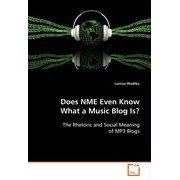 I realize that this post may be a bit lazy, but I'm in the process of writing a take-home exam this weekend for my social semiotics class, and I'm a wee bit panicked at the moment. So, I decided I would post an essay I wrote for a previous media studies take-home exam because it involves music and new media. It may seem a bit too academic for a blog post, but I think it's a relevant topic for those who are interested in music and the study of media in general. The question for this exam was to discuss the following Wired article about Universal and its CEO Doug Morris and their being completely unprepared for new media in the music world: http://www.wired.com/entertainment/music/magazine/15-12/mf_morris . In addition, we were supposed to reference Neil Postman's book Technopoly and Mark Poster's book Information Please. It was actually one of the more fun essays I've ever written.
I realize that this post may be a bit lazy, but I'm in the process of writing a take-home exam this weekend for my social semiotics class, and I'm a wee bit panicked at the moment. So, I decided I would post an essay I wrote for a previous media studies take-home exam because it involves music and new media. It may seem a bit too academic for a blog post, but I think it's a relevant topic for those who are interested in music and the study of media in general. The question for this exam was to discuss the following Wired article about Universal and its CEO Doug Morris and their being completely unprepared for new media in the music world: http://www.wired.com/entertainment/music/magazine/15-12/mf_morris . In addition, we were supposed to reference Neil Postman's book Technopoly and Mark Poster's book Information Please. It was actually one of the more fun essays I've ever written. The Medium is the Music
Seth Mnookin’s article about Doug Morris, the CEO of Universal Music Group, reveals how the music industry’s major, and costly, mistake was its inability to understand the nature of digital media in relation to traditional analog media. This error extends to the music industry’s misunderstanding of the Internet as a medium as well. Mnookin demonstrates how not only did Morris err in failing to recognize the changes that digital music and peer-to-peer sharing would pose, but he also initially responded in a way that attempted to control a medium - through lawsuits against Yahoo, YouTube, and MySpace for using Universal music videos without paying for them, and through charging Microsoft’s Zune Marketplace for using the Universal back catalogue - that cannot be controlled by traditional means, and perhaps not at all. As Mnookin notes, “the more restrictions you put on your files, the more you encourage customers to turn to illegal services to get songs the way they want them.”
Mark Poster views the potential of the Internet and peer-to-peer music downloading as having two possibilities: “an Orwellian extension of governmental and corporate controls or a serious deepening of the democratization of culture” (193). In Mnookin’s article, it appears that Morris and Universal Music tends to favour the former more than the latter. Because Universal’s goal is to increase profit, and because its primary way of achieving this goal is through selling music, Morris ostensibly still sees peer-to-peer downloading of music as theft. Poster argues that the Recording Industry Association of America (RIAA), who also view MP3 sharing as theft, was making errors in their understanding of media differences: “In their suit of September 2003, the RIAA acted as if downloading music files is the same thing as taking a music CD from a retail store without paying for it. This claim of equivalence is a political move that ignores the specificity and differences of each media – CDs and digital files. When the CD is taken from the store, the store no longer has it; when the file is downloaded, the person sharing the file still has it” (189). Morris’s “blasting MP3 players as merely ‘repositories for stolen music’” makes the same assumption as the RIAA, an assumption which does not make sense in that digital objects like MP3s are copied, not actually stolen in the traditional sense of theft. This issue also complicates and evades traditional copyright law. Poster states: “Copyright law covered the medium in which inventions or acts of genius were embedded for reproduction” (197). However, now that the medium has changed from traditional ones like printing presses and CD manufacturers to the Internet and its attendant programs, the nature of how production and reproduction function has changed drastically.
In explaining these fundamental shifts, Poster writes: “Digital cultural objects do not fall under the laws of scarcity and the market because they require almost no cost to produce, copy, and distribute, and like ideas they do not diminish when they are given away” (195). In this way, digital cultural objects threaten the capitalist market and those, like Morris, who gain most from it. If music is no longer viewed as a commodity, but instead a public possession that does not require economic power to exist or be distributed, then corporations like Universal seem to be obsolete under this new system: “In short, digitization changes the nature of the producer and the consumer, blurring the boundary between them” (Poster 195-96), and “Digitization threatens the media corporations because one no longer requires great amounts of capital to produce, reproduce, modify, and distribute cultural objects” (198). Mnookin writes that Morris and Universal’s “current moves – DRM-free songs and the Total Music subscription service – aren’t about serving consumers, at least not principally. They’re aimed at taking on Steve Jobs and, specifically, limiting the power of iTunes,” meaning that it appears that Morris has still not completely understood the nature of the new media and how it is changing the capitalist market for cultural products.
Morris insists on continuing to think about competition within the traditional capitalist system, and his long-term competition is not other corporations, but those who understand the new media better than he does – the consumers themselves. Not only is there a serious threat to the cultural corporations of America, but there is a further political link in that, for the US, cultural objects are “second only to defense in export value” (208). If the national economy can no longer support itself through cultural exports like music, the entire country will be affected, and the government may be more likely to try to step in and control media sharing; however, as demonstrated by the control problems experienced by the music industry, there would be great difficulty policing the Internet for media sharing, especially under current laws. The global networked nature of the Internet also poses a dilemma because every country would have to adopt the same laws regarding media sharing, a daunting task, and it would not necessarily safeguard against constant innovation in technology finding ways around these laws.
The constant innovation in the sharing of digital music creates an interesting paradox in which the very foundations of the capitalist system are the cause of its problems. Despite Morris’s acquiescence with giving music away through Total Music, Mnookin points out: “The irony is that if he decides to base his plans around DRM, Morris will be missing the larger truth that has propelled his business for the past 30 years. Ultimately, it’s convenience and ease of use that drive new media formats.” Morris’s attitude demonstrates this paradox in that “If the music industry wins its case against Internet technology, capitalism loses its legitimacy as the bearer of progress” (Poster 190). With the advent of digital media and file sharing networks over the Internet, the progress narrative of capitalism is halted because the advances that appear to be in the processes change the nature of the product; in a McLuhan-like way, the medium becomes the message.
Furthermore, this aspect of the Digital Age has been overlooked by the music industry, and it ensures that process exceeds content in its importance and dominance. Neil Postman argues that “Because of what computers commonly do, they place an inordinate emphasis on the technical processes of communication and offer very little in the way of substance [...] The computer is almost all process” (118). By looking at the issue of digital music sharing in this light, it seems that the computer and the Internet value speed and reach of communication over what is actually being communicated between users; this is not to say that people do not care about the music they listen to, but that they feel entitled to it because of the very process and medium that makes it available to them.
In Mnookin’s article, Rio Caraeff, executive VP of Universal’s digital strategy, says “the company will eventually need to transition from running a product-based business to running a service-based one,” including ringtones, subscription services, and deals with mobile providers. This shift in strategy shows how the attempted control over the products, which are arguably the content of the medium, has been shifted to control over the form of the medium; in effect, Universal realizes that music and many other cultural products are no longer physical, tangible commodities, and their existence is both fluid and public. This issue also raises the question of what happens when something becomes part of the public domain, and with the Internet, what is actually public? As Poster demonstrates with his discussion of internet identity theft, everything tends to become externalized through the medium of the Internet, radically changing the perceptions of privacy and the public domain.
Besides the loss of profit for the corporation, the music industry’s main argument against peer-to-peer file sharing is that it is also violating artists’ royalty benefits. Poster gives three reasons to refute this argument: it is not necessarily true that artists receive compensation for the reproduction of their work, file sharing does not mean the sale of commodities, and the artists themselves have “borrowed” from others in the creation of their art (201-02). He also argues that most of the royalty money an artist earns is taken by production costs, and that distribution of an artists’ music has not been a fair process before file-sharing in that radio stations and DJs were often bribed to play certain artists on heavy rotation (205). The “unfairness” of file-sharing is unfair to the industry only because it negatively affects the industry itself and has nothing to do with popularity being an indication of music’s status as an art form.

The recent tactic employed by Radiohead in allowing their fans to choose the monetary value of their latest album poses an interesting alternative to current music download practices and raises particular issues about the capitalist market and the value of cultural objects. Since Radiohead was no longer attached to a contract with a major label when they released their latest album, they chose to release their album as a download and those who wanted it could pay any amount they deemed worthy of the album, including paying nothing. The average price chosen by those who purchased the album turned out to be £5 (approximately $10 US), which perhaps places the album at a slightly lower price than it would have sold at conventionally; however, considering the record company was not involved, thus not making money from it, the band likely made more profit per album than by selling it through a major label, which would have taken a higher percentage of each total, thus increasing the price presented to consumers. Also, there may have been a higher percentage of people who paid a considerably lesser price than the average, but would have illegally downloaded it for free elsewhere otherwise. A tactic like this may not have worked as successfully without a high-profile band with an established, strong fanbase, but it does change the way in which people think about music and other cultural products. By allowing consumers to assign their own worth to a cultural product, Radiohead relinquished the control that Morris and Universal refuse to.
There also many bands with profiles on MySpace, who are either unsigned or are signed to a truly independent label or distributer rather than an “independent” branch of a major label. In these bands’ cases, they remove the middleman of a major label and sell their music directly to their fans. Because music production technology has also become more available and relatively cost-efficient to use, many artists no longer need a major label to pay for studio time or producers. The role of major labels as having promotional clout is also waning with the amount of buzz being generated by either the artists themselves or independent music bloggers. Most recently, an independent act named IAMX (www.iamx.co.uk), which is based in Europe, managed to tour successfully throughout North America without any promotion outside of their Internet networks and “street teams” composed of fans. In effect, they have cut out the need for a major label for production, distribution, and promotion. While Morris and Universal have chosen to attempt “an Orwellian extension of governmental and corporate controls,” artists as diverse as IAMX and Radiohead are embracing “a serious deepening of the democratization of culture.” The difference lies in the recognition and understanding of the new media and its inevitable effect on capitalism and culture.
Nude - Radiohead
House of Cards - Radiohead
We're in the Music Biz - Robots in Disguise





















































No comments:
Post a Comment